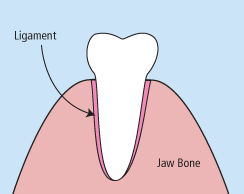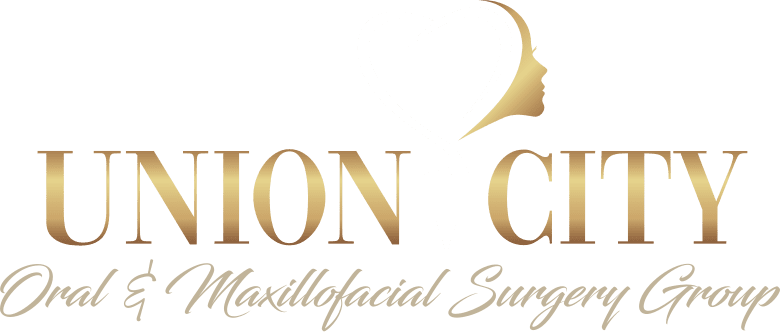Tooth Extraction
What This Page Covers:
- Two Types: Depending on your unique condition and needs, you may get a simple or surgical tooth extraction. The simple procedure is for easy-to-access teeth that can be removed in one piece. Surgical extractions are for broken, impacted, or hard-to-access teeth.
- Who Needs a Tooth Extraction: Persistent bad breath, sensitivity, swelling, pain, headaches, bleeding gums, and overcrowded or loose teeth are signs that may indicate the need for a tooth extraction.
- Procedure: The extraction process involves anesthesia and sedation, gentle loosening and removal, socket cleaning, and potentially stitches. Proper aftercare, including avoiding certain activities and taking prescribed medications, ensures a smooth recovery.
- Benefits: Getting a tooth extraction with Union City Oral Surgery Group offers several patient benefits, including pain relief, a pathway to a stronger smile, infection removal, preparation for other treatments, and preventing future oral health issues.

Often, dental problems are exceptionally painful and can drastically impact your everyday life. Fortunately, those who suffer from dental pain can seek treatment from an experienced oral surgeon to relieve their suffering and protect their smiles. For many dental conditions, tooth extraction may be the most effective way to treat your pain and other symptoms.
If you are suffering from tooth pain and believe you may require an extraction, do not hesitate to contact an experienced and skilled oral surgeon. At Union City Oral Surgery Group, we are dedicated to providing a patient-first approach to our care so we can prioritize your health and comfort. Our surgeon, Dr. Nancy Herbst, has more than 25 years of experience in using innovative technologies to provide her patients with exceptional care.
There are times when it is necessary to remove a tooth. Sometimes a baby tooth has misshapen or long roots that prevent it from falling out as it should, and it must be removed to make way for the permanent tooth to erupt. Other times, a tooth may have so much decay that it puts the surrounding teeth and jaw at risk. When this occurs, we may recommend removal and replacement with a bridge or implant. Infection, orthodontic correction, or problems with a wisdom tooth can also require removal of a tooth.
The root of each tooth is encased within your jawbone in a “tooth socket” and is held in place by a ligament. In order to extract a tooth, Dr. Herbst must expand the socket and separate the tooth from the ligament that holds it in place. In some cases, a root is curved or very long, and the tooth socket cannot be widened enough to remove the tooth as a whole. In these situations, Dr. Herbst will section the tooth to remove it in pieces.
Signs You May Need a Tooth Extraction
If you believe your tooth may require extraction, it is always in your best interest to see an oral surgeon sooner rather than later. Leaving the tooth for too long may cause additional discomfort and health problems. A few signs you may require a tooth extraction include the following:
- Unexplained and persistent bad breath
- Sensitivity, bleeding, or swelling near the back of mouth or wisdom teeth
- Pain in your mouth, teeth, jaw, or neck
- Headaches that spread from your jaw
- Bleeding or inflamed gums
- Overcrowded teeth
- Broken or chipped teeth
- Loose teeth
If you are suffering from the symptoms above, do not hesitate to contact an experienced oral surgeon. Your surgeon will be able to accurately diagnose whether you require a tooth extraction as well as a treatment plan that fits your unique needs.
What Are the 2 Types of Tooth Extractions?
When determining if a tooth extraction is necessary for your condition, we closely examine your oral health, the affected tooth, and your health history. Depending on your unique needs and the tooth or teeth that need to be removed, we may perform one of two types of extractions: simple or surgical.
Simple Extraction
Simple extractions involve removing teeth that are clearly visible and easily accessible in the mouth. This type of extraction typically does not involve sedation or sutures, making for a smooth, quick procedure. A local anesthetic is applied to numb the area, ensuring a pain-free experience. If you have dental anxiety or have trouble relaxing, we may use laughing gas to help you feel more comfortable and allow the dentist to complete the extraction quickly.
Surgical Extraction
If a tooth is difficult to access due to its shape, brokenness, or curvy, long roots, you may need a surgical extraction. This is often done with wisdom teeth, which typically do not erupt from the gums, making them challenging to remove easily. Surgical extractions are also done for teeth that are fractured below the gumline. With this type of extraction, patients receive sedation due to the intensity and length of the procedure.
What to Tell Your Surgeon Before Your Tooth Extraction
Prior to a tooth extraction, it is essential that your surgeon has an accurate understanding of your medical history. Be sure to inform them of all of your medications, treatments, and conditions before your initial x-ray. Some health conditions that are critical to disclose to your surgeon include the following:
- Congenital heart defects
- Liver disease
- Thyroid disease
- Diabetes
- Artificial joints
- Renal disease
- High blood pressure
- A compromised immune system
- Damage you your heart’s valves
- Adrenal disease
- Bacterial or fungal heart infections
Your surgeon will likely want to ensure your conditions are stable and being treated. They can use your medical history to determine the best path forward to extract your tooth safely.
4 Steps Involved in the Tooth Extraction Procedure
We understand even the most straightforward dental procedures, like tooth extraction, can be daunting, so we communicate with you before the treatment so you know the steps involved. While every patient is different, we generally take the following steps during tooth extraction:
- Anesthesia: To ensure a pain-free experience, we administer anesthesia and sedation, depending on the length of your procedure and personal preference.
- Removal: Once you are comfortable, we begin the tooth extraction by loosening and carefully lifting the tooth from the socket. If the tooth is decayed, broken, or under the gums, we may need to make an incision in the gums to access it.
- Cleaning: After the tooth is successfully extracted, we clean and disinfect the socket to eliminate potential bacteria and prevent infection.
- Stitches: If we make an incision during your extraction, we will close it with stitches to promote healing.
In addition to discussing each step of the procedure with you, we also inform you how to take care of the area so it heals properly. This includes keeping the site clean with an antibacterial wash, taking all medications, and avoiding any strenuous activity for at least two days to prevent excessive bleeding and discomfort. With our guidance and support, you can make a speedy recovery and return to your usual activities in no time.
What Are the Benefits of Tooth Extraction?
At Union City Oral Surgery Group, we do everything possible to preserve your natural teeth, but there may be cases where a tooth needs to be extracted to protect your oral health. If you need a tooth extraction, you can feel confident knowing the procedure will provide several benefits, including the following:
Pain Relief
Having a damaged or decayed tooth can cause serious pain that interferes with your everyday life. It may even prevent you from eating or drinking foods and beverages you normally enjoy. Removing the tooth provides immediate relief to improve your quality of life.
Prevention of Future Problems
Leaving a damaged, decayed, or impacted tooth in your mouth can cause overcrowding and increase your risk of developing more serious issues, like infections, TMJ disorder, and cysts, all of which require extensive treatment. Tooth extraction can help prevent these problems, saving you time, money, and pain later on.
Remove Infection
If the center of the tooth, called the pulp, is infected, a root canal may remove the infection. However, in severe cases, tooth extraction may be necessary. This procedure helps eliminate the root of the infection and, paired with antibiotics, helps prevent the infection from spreading.
Makes Room for Other Treatments
Oftentimes, people do not have enough room in their mouths for all their teeth, causing overcrowding. Removing one or more teeth, in this case, would make room for the teeth to shift into their proper places with the help of orthodontic treatments, such as braces and palate expanders.
Creation of a Stronger Smile
If you are already missing teeth or have weak or damaged teeth, you may get extractions before getting dental implants, small, titanium posts topped with a restoration that replace missing teeth at the root. Therefore, getting teeth removed can open doors for a stronger, healthier smile that boosts your confidence.
While you may want to avoid getting teeth extracted, it can be beneficial to your oral and overall health. While there is a small risk of complications during the healing process, our dedicated team works closely with you to ensure you have the medications and care instructions you need to have a smooth, comfortable recovery.
What to Expect During and After Your Tooth Extraction
Though the extraction procedure is typically quick, it is important to share with our office any concerns or preferences regarding sedation. We generally utilize a local anesthetic for simple tooth extractions. During the extraction, you will not feel any pain, but you will feel pressure.
Once a tooth has been removed, you will need to place pressure on the area so a clot can form. After the clot has formed, do not rinse vigorously, suck on a straw, smoke, drink alcohol, or brush your teeth next to the extraction site for 72 hours. These actions could dislodge the clot and lead to excessive bleeding.
If you experience pain and swelling, apply an ice pack to the area and take pain medications as prescribed by our office. Any residual swelling and discomfort should disappear in a few days. If you are still experiencing pain and swelling after several days, contact our office as soon as possible.
Make an Appointment With a Skilled Oral Surgeon Today
If you require a tooth extraction, you deserve to be treated by a medical professional with a high level of experience, skills, and compassion. At Union City Oral Surgery Group, we are committed to putting your health and comfort first to ensure you have the best experience possible under our care. Our surgeon, Dr. Nancy Herbst. Has over 25 years of experience in oral and maxillofacial surgery and is highly-qualified to handle your tooth extraction with care and expertise. She employs the latest technology to effectively diagnose and treat patients with many pain-free procedures.
To schedule an appointment and learn more about how she can help you, call our office at (201) 831-7931 or complete our contact form today.

